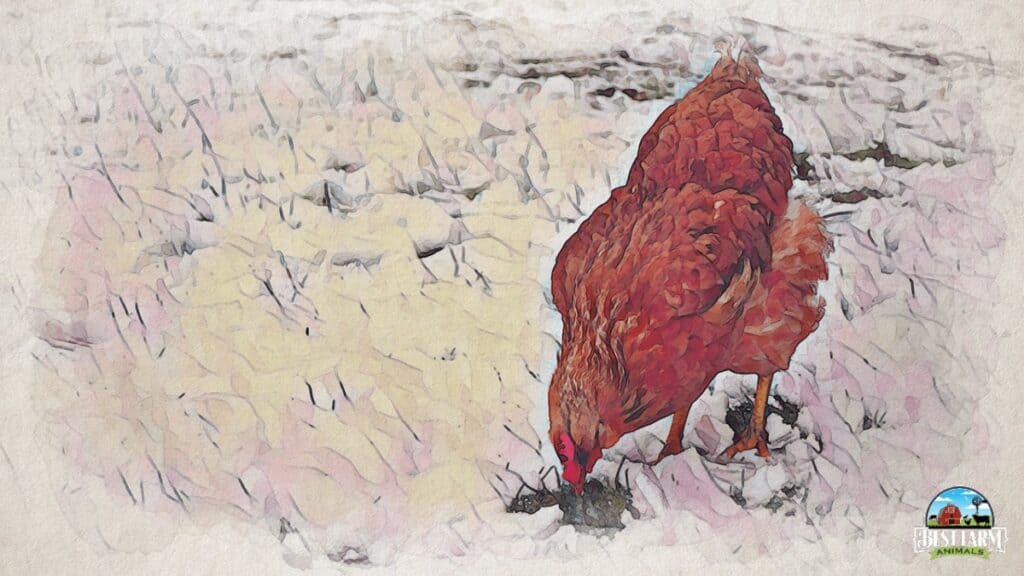Many chicken coops don’t have electricity but experience cold winters. In Eastern Idaho, we got down to -16℉ several times in December, yet I didn’t lose a single chicken to the cold weather.
In this article, I’m going to share with you 14 things you can do to keep your chickens warm in the winter without electricity. You don’t have to heat your coop to keep your hens happy, warm, and safe from the cold- even during very cold spells.
- How Do Chickens Stay Warm?
- Caring For Chickens In Cold Weather
- 20 Tips How to Keep Chickens Warm In The Winter Without Electricity
- 1. Keep Good Ventilation In The Chicken Coop
- 2. Eliminate Drafts In The Chicken Coop
- 3. Inspect The Coop Before Fall Starts
- 4. Move The Coop For Protection
- 5. Keep Chickens’ Water Unfrozen
- 6. Avoid Metal Perches In The Coop
- 7. Keep The Feeders Full Of Corn And Scratch
- 8. Use Vaseline To Avoid Frostbite
- 9. Use Extra Straw To Coat The Ground When It Snows
- 10. Add Bales Of Hay Inside The Coop
- 11. Keep The Coop Clean
- 12. The Deep Litter Method Nurtures Healthy Microbes
- 13. Place Perches At Least 2 Feet Above The Ground
- 14. Add Insulation To The Coop
- 15. Face Coop South To Take Advantage of Winter Sun
- 16. Use A Hoop House To Provide Warmth
- 17. Keep Chickens Entertained To Ward Off Bullying
- 18. Keep Water Outside The Coop
- 19. Manage The Snow
- 20. Choose the Right Chicken Breeds For Winter
- Do Chickens Need Heat In The Winter?
- Heating The Chicken Coop Pros and Cons
- Pros of Heating the Chicken Coop
- Cons of Heating the Chicken Coop
- Prevent Chicken Eggs From Freezing
- Keep Chickens’ Water From Freezing
- Cold Weather Chickens FAQs
- Conclusion
How Do Chickens Stay Warm?
During winter, chickens stay warm by fluffing their feathers and trapping air around their bodies, maintaining a temp of 106℉. The air acts like insulation, and when chickens huddle together, it compounds their ability to stay warm. Fluffing is an effective insulation against the cold unless their feathers get wet.
Some people assume that chickens can’t handle the cold much more than you or I can, but chickens survive in extreme cold. Even so, it can still be dangerous for them when it gets very cold and I’ve known about many chickens that freeze to death during cold nights.
If you live in a cold climate and raise chickens, it is important to understand what you can do to keep your chickens safe and warm. It’s also important to understand when taking safety steps is critical.
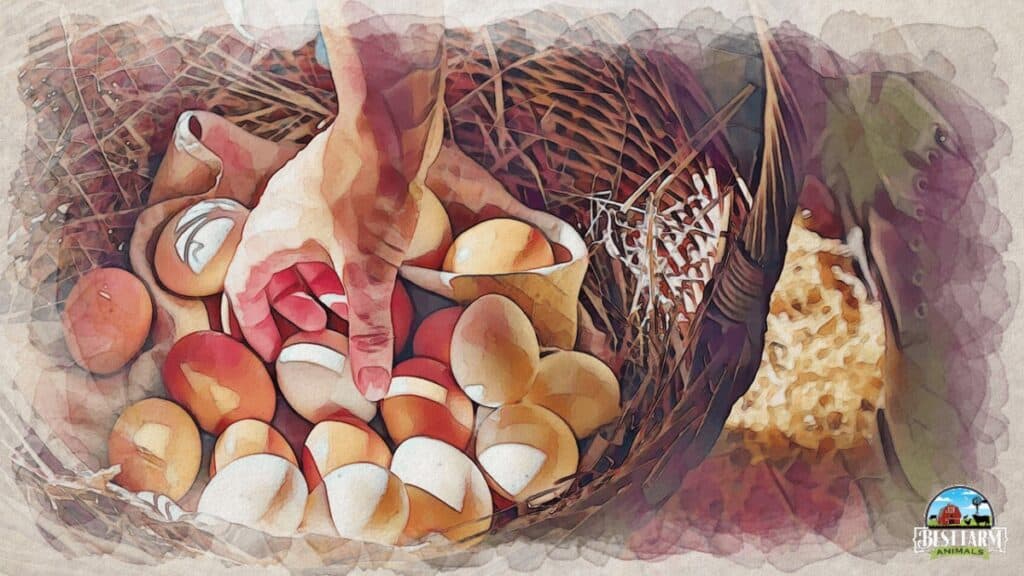
Caring For Chickens In Cold Weather
Chickens in cold weather can and do get cold-stressed when their bodies cannot produce as much heat as they lose. This can cause a hen to get sick, have frostbite, or die of the cold.
My neighbor had this happen when she found three dead chickens in her coop the morning after a particularly cold night.
Fortunately, there are steps you can take to keep your flock warm, even when the temperatures dip far below zero.
A chicken’s average body temperature is 106℉. When temperatures drop below freezing, some chickens can experience stress from the cold weather. Chickens in cold weather that have adequate resources are able to stay warm into very low temperatures.
You can help by providing enough roosts for hens to fluff out, raising roosts 2 feet above the ground, and ventilating the coop. Provide high-energy foods, unfrozen water, and bedding to assist your flock in staying warm.
In this article- we’ll discuss how to prep your coop for cold weather, how to help your flock be ready, best winter foods to feed, and when you need artificial heat.
20 Tips How to Keep Chickens Warm In The Winter Without Electricity
Your chickens can stay warm with the right resources. There are several things you can do to help keep your flock warm and safe from very cold weather.
Even though chickens do well in cold temperatures, they can suffer and die when it is very cold outside. Last winter, our local school was closed last winter because the wind chill factor was down to -20℉. To avoid that from happening to your flock, here’s how to protect them during winter.
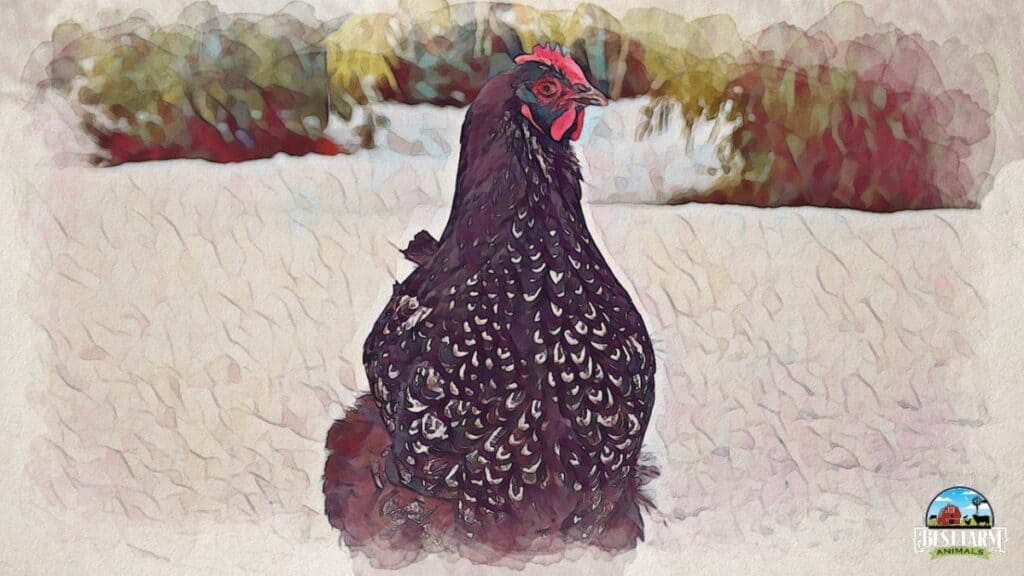
1. Keep Good Ventilation In The Chicken Coop
One of the ways to protect your chickens from winter cold and moist air is to have a coop with good ventilation. This is critically important.
Chickens expel a lot of moisture when they breathe. Their droppings also have high amounts of water in them. Moist air means more condensation and a higher risk of frostbite. It means more mold and mildew, which brings deadly respiratory problems.
Plus a poorly ventilated coop can build up ammonia easier, which will also kill your chickens.
Ventilation should be in the upper parts of the coop to allow humid, warm air to escape the coop. Ideally, vents should be at least 2 feet higher than the roosts your hens sleep on.
2. Eliminate Drafts In The Chicken Coop
Keep your chickens warm in the winter without electricity by eliminating drafts in the chicken coop. Nothing cools down a coop faster than wind or drafts.
Seal the walls of the chicken coop to create tight draft-free walls. The walls around your chicken’s perch and rest should have good, draft-free walls to protect them from wind and drafts.
Fill gaps and cracks in the coop with calling, foam, or even thick plastic. This will keep the wind from blowing snow and water into the coop.
Fill gaps and cracks in the coop with calling, foam, or even thick plastic. This will keep the wind from blowing snow and water into the coop.
But, above that, at the top of your coop, you should have vents. During the winter, the warmer, moist air will rise and be able to escape from your coop. This will keep your chickens healthier.
3. Inspect The Coop Before Fall Starts
Inspect your chicken coop to make sure that it’s ready for winter. Tighten screws, nail down lose boards, and seal cracks. A secure coop with withstand winter winds better than a loose or wobbly coop. You can also wrap a heavier plastic, 3, 4 or 6 mil thick, and staple to the outside of your coop to tighten it up.
Just remember to cut the plastic away from the vents.
4. Move The Coop For Protection
If your coop is portable, consider moving it closer to another building to help protect it from the cold.
Moving it into a shed can further insulate it.
5. Keep Chickens’ Water Unfrozen
Water to drink is critical in keeping your chickens warm without electricity. When chickens get dehydrated, they easily become chilled or get frostbitten.
Water retains energy better than dry materials. If your hens’ are fully hydrated, they will stay warmer during colder temperatures than if they are partially dehydrated.
Make sure that you take the steps necessary to keep their water unfrozen. Chickens need water to regulate body temperature, create warmth, and manufacture eggs, especially in cold weather.
But, providing chickens with unfrozen water can be problematic if you live in an area like I do where even hoses and underground pipes freeze
- Warm water can take longer to cool and freeze
- Adding a water bottle filled with salt water can help break up ice crust
- Use plastic or rubber water tubs that won’t chill from the ground as quickly
- Heated water container keep water unfrozen
- Change water frequently in unheated containers
- Place hot bottles of water under the watering containers
6. Avoid Metal Perches In The Coop
Avoid metal perches in your coop. Metal chills faster and can cause damage to your flock’s feet if it freezes during the night when they are roosting.
Anyone whose licked a flag pole knows how dangerous moisture is when skin touches frozen metal. The same thing can happen on a smaller scale to your chicken’s feet.
While they sleep at night, roosting on metal, it freezes and when they fly off it in the morning, skin sticks to it, causing damage to their feet.
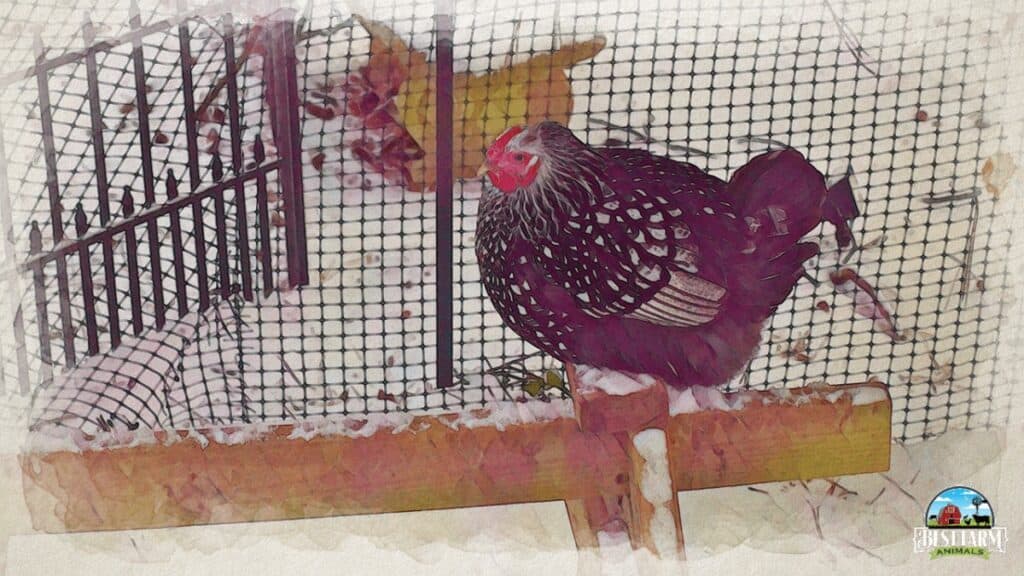
7. Keep The Feeders Full Of Corn And Scratch
Chickens stay warm without electricity in the winter if they have enough energy for their bodies to produce electricity. The type of feed your chickens eat is critical to providing enough energy for warmth.
During a cold winter, your flock needs extra energy. Corn is packed with extra energy to keep hens warm during digestion. It raises their body temperature.
Chicken scratch (with whole grains) also provides the needed energy. You can use a grain scratch or add whole grains to their scratch. Great grains for chickens include barley, wheat, oats, and corn.
Feed your chickens a little scratch, corn, or whole grains just before dark so they are filled and can keep warm during the night.
8. Use Vaseline To Avoid Frostbite
To keep chickens warm, use Vaseline to coat their wattles and combs to prevent frostbite. Check it at least daily. This one’s a little controversial because it helps to protect chickens during mildly cold weather.
A chicken’s wattles and combs are the part of their body that’s most at risk for frostbite. If you have any chickens with protruding wattles and combs, they are more vulnerable.
Vaseline helps to protect chickens up to 5 degrees below freezing, but during colder temperatures, can actually damage wattles if the vaseline freezes.
9. Use Extra Straw To Coat The Ground When It Snows
If you want to give your chickens some outside time during the winter, but want to keep their feet safe, spread hay and straw over the ground.
Chickens don’t like walking on snow. As a result, they will walk out on the snow, realize they are on snow and stop walking. They won’t retreat. They will often just stand in the snow until their feet freeze off.
Straw will keep chickens warm and insulate against the cold of the snow and will give them a way to still be outside during some of the day. Don’t spread straw inside the coop. Stray and hay mold easily and can cause issues.
If you do use straw, you will need to clean out the coop often.
In my area, we snow so much during the winter that spreading straw isn’t as feasible so I use the deep litter method (below) to help keep the coop warmer.
10. Add Bales Of Hay Inside The Coop
While you don’t want to spread straw out, adding bales of straw inside your coop can help to keep the coop warm without power or a heater.
Bales of straw can be placed around the outside of the coop to keep it warmer, but I prefer putting bales of straw inside the coop along the inside walls.
The straw will give your hens additional places to hang out above ground level where the coldest air will hang out.
11. Keep The Coop Clean
Chicken poop is high in moisture with about 80% water. Chickens usually spend more time in the coop during the winter than the summer. The nights are longer, colder, and chickens often stay inside during rain and snow.
As a result, the bedding get wet and mildewy during winter.
Keep your coop clean and change the bedding regularly or your chickens can get sick from ammonia build up.
And, mold and mildew are dangerous for chickens and their fragile respiratory systems.
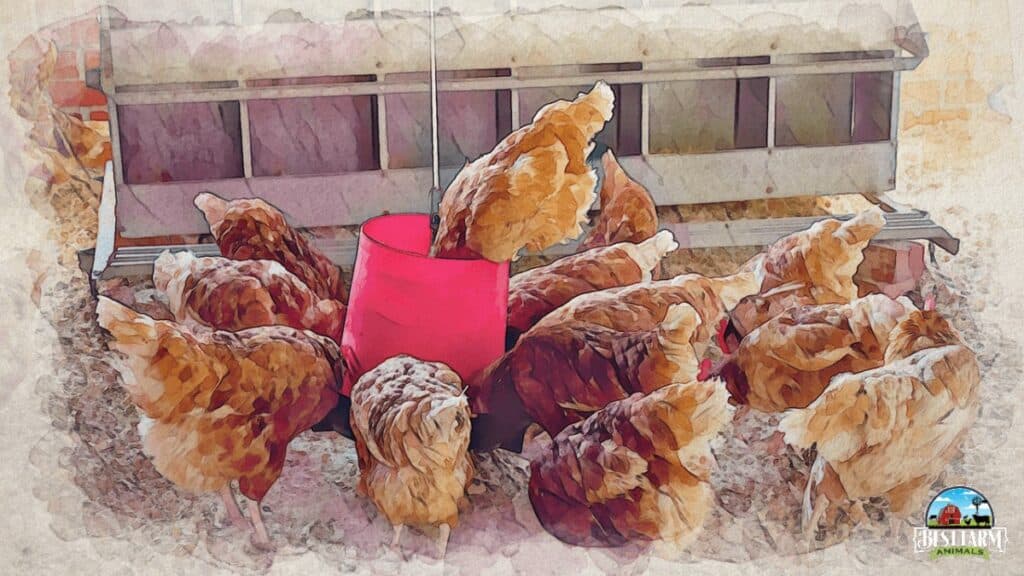
12. The Deep Litter Method Nurtures Healthy Microbes
The Deep Litter Method nurtures healthy microbes and creates a little heat. When it gets bitter cold outside, I don’t really want to keep cleaning out the chicken coop all the time.
The Deep Litter Method uses a deep layer of wood chips to compost and break down chicken poop. In my chicken coop, I have a 12 inch layer of wood chips on the floor of the coop.
The wood chips absorb the moisture from chicken waste and keep it from smelling. The deeper layer of the wood chips breaks down into compost and nurtures healthy microbes.
The deep litter method allows chickens to feel warmth during winter even without electricity.
13. Place Perches At Least 2 Feet Above The Ground
By placing your perch above the ground, it gets your chickens above the coldest part of the coop. Chickens love to perch and will perch huddled together.
Hopefully, you have enough room for all of your chickens to perch together. This will allow them to share body heat and stay warm. Make sure that you have enough space or multiple perches that won’t leave a single chicken huddled alone during the cold nights.
14. Add Insulation To The Coop
Keep your chickens warmer in the winter by insulating your coop. Insulation will keep the coop warmer without requiring electricity to heat it.
My favorite insulation for a coop are the 2 inch insulation boards because they are easy to place around the coop and cut with a razor blade.
Other options include straw bales, fabric, hay bales (more expensive and mold faster), and cardboard.
Add straw to the nesting boxes for additional padding and insulation. You can also add curtains to the front of the boxes to help them stay warmer.
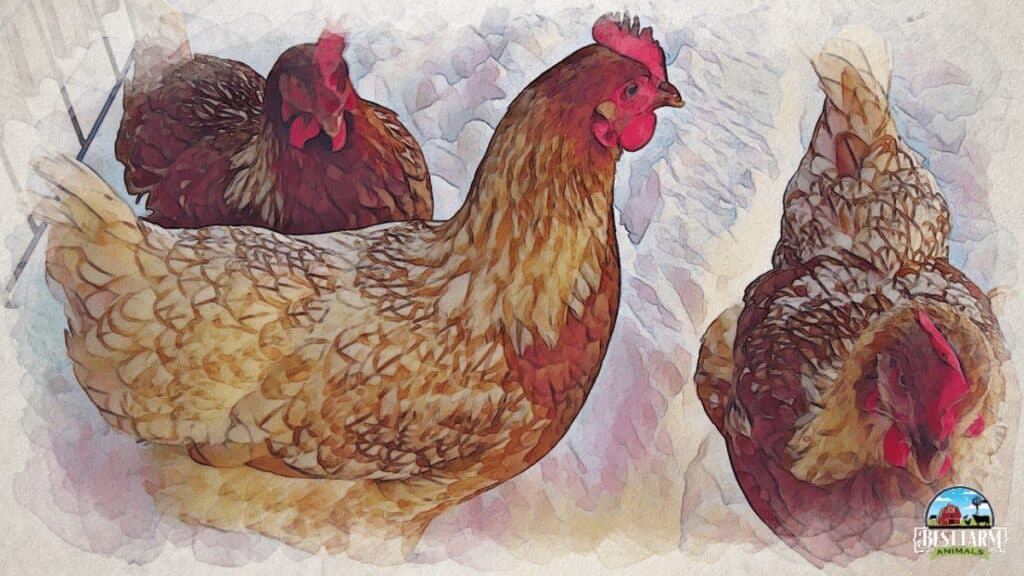
15. Face Coop South To Take Advantage of Winter Sun
Face your coop south so that the coop can warm up from the southern winter sun. It’s a strategy often used in greenhouses and it works for chicken coops also.
If your coop has windows, face the windows south so they can absorb the warmth of the sun.
16. Use A Hoop House To Provide Warmth
Use a hoop house covered in greenhouse plastic to provide your flock with snow-free ground and added warmth.
We built a hoop house out of cattle panels and railroad ties and wrapped it in plastic. It protects the ground from snow and provides a snow-free place for my chickens to forage. Now my flock can migrate to the hoop house or the coop on a cold winter’s day.
The plastic traps some of the sunlight and acts like a miniature greenhouse. Hens love being able to still forage for bugs and stay out of the snow.
17. Keep Chickens Entertained To Ward Off Bullying
Winter chickens often get bored faster than usual. The frozen ground prevents dust baths and keeps them from scratching for bugs. Its also harder for them to sunbathe.
Active chickens create more body heat.
Plus chickens get really bored in the winter, which can increase bullying. Provide entertainment to keep your chickens active and warm.
Some examples of entertainment that keeps chickens active include:
- Hang a head of broccoli or cabbage from the coop for them to peck at.
- Add a mirror or swing to the coop for play
- Use chicken toys
- Add balls to the coop
18. Keep Water Outside The Coop
Water in the coop is easily spilled and increases humidity. Chickens are ok without water at night but need constant fresh water during the day.
You can place water containers outside under a smaller shelter to keep the coop air dryer and warmer, but you’ll need to balance that with the increased chances that water will freeze.
19. Manage The Snow
Snow can quickly build up around and ontop of the coop. If snow builds up on the roof of your snow, keeping it shoveled off will help the coop stay warmer.
Shovel snow around the doors of the coop so the door can close easily without snow buildup. It will also make it easier for your hens to go outside during the day.
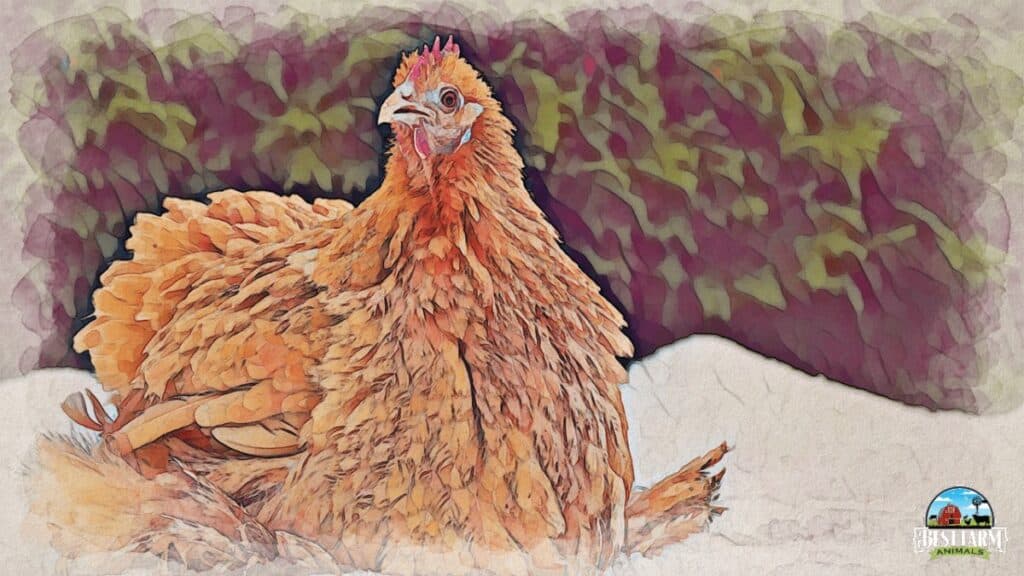
20. Choose the Right Chicken Breeds For Winter
Some chicken breeds like Silkie chickens and Naked Neck don’t do well in the winter. Australorpe, Chandelier, and Orpingtons are great chickens for the winter. Check out this article if you’d like a full list of cold-winter chicken breeds.
Generally speaking, darker chickens, those with heavier feathers, and smaller wattles and combs do the best in colder climates.
Do Chickens Need Heat In The Winter?
Some chicken owners prefer to heat their chicken coop in the winter, but most of the time chickens don’t need heated coops. In fact, heated coops can cause increased dager when the power goes out and flocks aren’t used to cold weather.
When chickens don’t have heated coops, their bodies adjust to the cold weather as fall and winter set in. Cold spells are much less dangerous to hens adjusted to colder temperatures.
Chickens don’t need heat in the winter because they can adjust to winter cold with a heavier layer of feathers that insulate their bodies.
Do chickens keep each other warm? Chickens keep each other warm when it’s cold outside. Chickens huddle together and puff their feathers to create insulated warm air against their bodies that protects against cold weather. While roosting, chickens naturally create warmth when they cluster close together.
Your hens will be able to keep each other warm by roosting together and fluffing their feathers. In some cases, such as a rapid, severe temperature drop that doesn’t allow chickens to adjust- chickens may need temporary help staying warm while they adjust to colder temperatures.
Heating The Chicken Coop Pros and Cons
If you choose to heat your coop, there are pros and cons
Chickens can usually maintain a body temperature of around 106 Farheinheit. Their feathers and huddling together during especially colder nights can usually keep them warm as long as they haven’t had an artificial heat source during the fall to keep their bodies from adjusting to the colder weather.
Pros of Heating the Chicken Coop
- Heat can keep chickens warmer during a drastic drop in temperature
- Heat often provides owners with a sense of security that hens are cared for
Cons of Heating the Chicken Coop
- Heated coops can keep chickens from adjusting to colder temperatures
- Heated coops can cause a fire
- Electricity costs money
- Many coops don’t have electricity access
- Solar heaters can cost more
Prevent Chicken Eggs From Freezing
My chickens continue to lay eggs in the winter without artificial light. If you have cold-weather breeds, such as Australorps, you may still see just as many eggs in the winter as in the summer.
Even if your chickens have slowed their egg-laying production, check for eggs more often than usual.
Gather your eggs more often so they don’t have time to freeze.
You may also want to add a curtain to your nesting boxes so they stay warm longer before freezing.
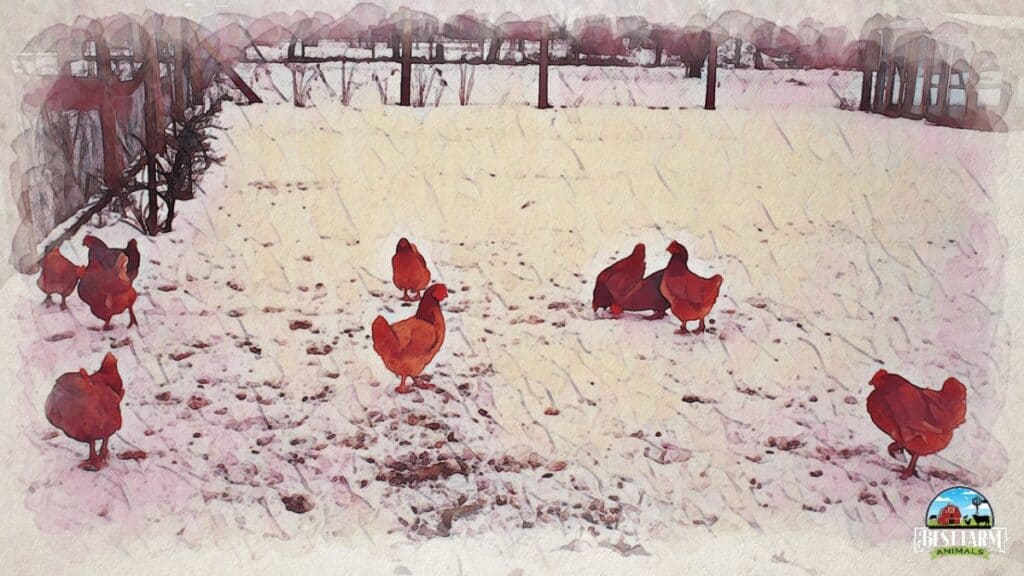
Keep Chickens’ Water From Freezing
Water to drink is critical in keeping your chickens warm without electricity. When chickens get dehydrated, they easily become chilled or get frostbitten.
Water retains energy better than dry materials. If your hens’ are fully hydrated, they will stay warmer during colder temperatures than if they are partially dehydrated.
Make sure that you take the steps necessary to keep their water unfrozen. Chickens need water to regulate body temperature, create warmth, and manufacture eggs, especially in cold weather.
Cold Weather Chickens FAQs
Will chicken be OK in cold weather? Chickens survive well in cold weather. Most chicken breeds are well-suited for colder weather, although some do very well in extremem cold. A chicken’s feathers help to trap warm air. Chickens usually fluff up to cover their feet and tuck their beaks into their feathers to keep all of them warm. This works well unless feathers get wet or are exposed to cold wind. It’s important to provide a coop that’s draft free and well-ventilated to keep the humidity levels down.
Can chickens freeze to death? Chickens can freeze to death and are more suspectible if their water is froze, are unhealthy from other issues, wet, or don’t have adequate protection from the weather. Hens that face a shortage of food, excessive bullying, or that stay out in wet weather will chill faster and face freezing to death.
Conclusion
Keeping your chickens warm in the winter without electricity doesn’t have to be complicated. Nor do you have to take all of the steps listed in this article. Water, good feed, and a draft-free coop are the three most important steps to keep your flock warm in freezing temperatures.
You can raise chickens whether you live in a climate with mildly cold or extreme winters. Cold-weather breeds are ideal for minimal care during cold winters. But, most other breeds can survive in the winter with a little extra care and protection.
My Favorite Chicken and Duck Supplies
This list contains affiliate products. Affiliate products do not cost more but helps to support BestFarmAnimals and our goal to provide farm animal owners with accurate and helpful information.
Manna Pro Oyster Shell keeps eggs strong. Before I gave my chickens oyster shell, I had the oddest eggs, many with weak and irregular shells. Now, I don’t have an issue.
Layer Feed by Manna Pro. I like pellets rather than crumbles as my chickens eat them better and less gets wasted or scavenged by rodents. A good layer feed makes the difference in hens laying many more eggs.
My chickens love this mealworm treat, which gives added protein, something that’s great during molting and winter months.
There are many ways to feed and water your chickens. I like this food and water setup the best because it reduces waste, saves me time feeding and watering, and keeps the food fresh longer. Except, in the winter, I use a heated waterer. The only problem is the heated waterers need to be replaced every few years.
I love this chicken veggie hanger. It makes it easy to give your chickens produce from the garden and keep them occupied in the winter with a fresh head of lettuce.
These chicken toys are a hoot! They will help curb bullying and keep your chickens active, especially in the winter when hens tend to get more lethargic.

